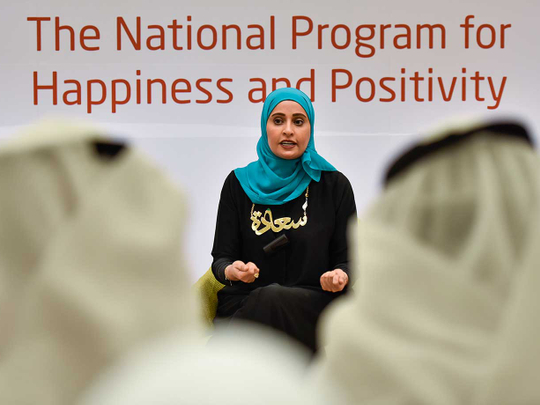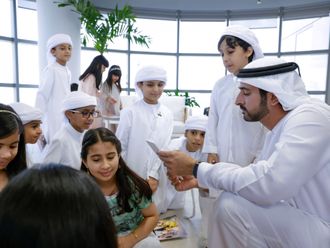
Dubai: The UAE is interested in learning about what makes you happy.
Mothers, students, labourers, employees and all segments of society will be surveyed to find out what makes them happy, starting this year, Minister of Sate for Happiness Uhoud Khalfan Al Roumi said on Wednesday.
The survey will be customised for each segment of people to learn about what makes them happy, and help create policies and programmes that fulfil the objective of the country of having a happy society.
During a press conference held at the Prime Minister’s office in Dubai on Wednesday, Al Roumi also said both expatriates and nationals would be targeted in the surveys and programmes she plans to launch with the help of both public and private sectors.
“Measuring happiness is one of our most important objectives. We want to know what makes a stay-at-home mother happy, what makes students happy and what makes employees, labourers and elderly happy. We want to reach all segments of society and ask them what affects their happiness.”
Al Roumi said the survey is currently in the design process because while there are international surveys available, she wants to have a customised survey for the UAE. She expects the survey to be ready this year.
“My job as the UAE Minister of Happiness is to make sure all programmes and policies adopted by the government are in harmony with the concept of happiness that the UAE wants to adopt. If we look at the federal government, we have 90,000 employees and a budget of Dh48.5 billion, this is the budget we have for happiness,” she said.
His Highness Shaikh Mohammad Bin Rashid Al Maktoum, Vice-President and Prime Minister of the UAE and Ruler of Dubai, announced earlier this month that all government bodies will appoint a Happiness Chief Executive Officer and federal ministries will have a happiness and positivity council.
Al Roumi said the newly appointed officers will be trained on how to measure happiness and implement programmes that promote happiness in their respective departments.
The private sector will also be encouraged to contribute to creating programmes and taking part in surveys that measure and achieve happiness.
“Our role is also to encourage private sector to join the drive towards happiness. This is very important because it contributes to a big part of our economy and if happiness is fulfilled in the private sector, it will not only improve our reputation and our competitiveness but also the services provided to both residents and tourists,” she said.
Al Roumi emphasised the importance of having happy employees, stating that studies prove that happiness in the workplace means more productivity.
“Studies found that employees who are happy are 80 per cent focused on their work, while unhappy employees are only 40 per cent focused on their work. This means that companies with unhappy employees lose 100 days of work a year.”
Al Roumi said happiness has become so important that seven Ivy League universities teach happiness and Harvard has 29 professors who teach happiness. Besides, there are 78,000 books on Amazon about happiness and there are 58 Tedx videos about happiness with over 100 million views.
Al Roumi also stressed on the importance of raising awareness, based on scientific research, among the public about the beneficial effects positivity and happiness have on their well-being. She said research has found that those who are positive are more likely to live seven-and-a-half more years than those who aren’t.
In addition to positivity, she said national identity and religious beliefs that promote giving and kindness like Islam also lead to happiness.
Bringing happiness to...












